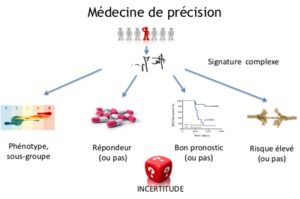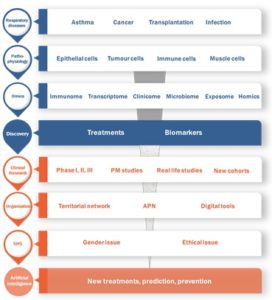Presentation of LUNG innOvatiOn



The LUNG O2 integrative research cluster will create a unique interdisciplinary excellence network in precision medicine for pulmonary diseases. Expertise in the field already exists through high level basic and translational research teams in CHU de Nantes, INSERM laboratories and Ecole Centrale de Nantes (ECN). These teams want to join their forces and work in synergy with each other and thus respond together to all aspects of this new age medicine.
LUNG O2 objectives
The LUNG O2 cluster aims to propose lung diseases as a demonstrator for Precision Medicine in Nantes and its territory by gathering all aspects of this new health care thinking from basic science to real life implementation, thus paving the path for other diseases
More specifically, LUNG O2 will :
- Trigger new Precision Medicine research projects by gathering all teams involved in pulmonary research in the fields of lung cancer, lung transplantation, asthma and pneumonias, each of them excelling in different approaches (pathophysiology, cohorts, big data analysis, biomarkers, clinical trials, connected tools, ethics)
- Create a respiratory territorial network aiming to propose a research pathway to all patients prefiguring the organization of Precision Medicine implementation
- Offer excellence international level training programs for under- and post-graduate students from medicine, biology, nurse sciences, engineering, pharmacy, and also for patients
- Raise new international consortia including academic and industrial teams and attract foreign researchers and post docs through dedicated meetings and summer schools.
LUNG O2: towards precision medicine for respiratory pathologies
LUNG O2 is devoted to Precision Medicine as defined in Axis 3 of the NExT project: “personalized therapeutic decision-making will be achieved by interpreting individual trajectories for chronic diseases and cancer in the light of reference datasets and by delivering real-time evidence-based evaluation of several clinical evolutions and therapeutic scenarios”.

The continuous increase of lifetime and ageing in developed countries requires a deep transformation of medicine to make the society able to face the expected rapid progression of cancer and chronic diseases prevalence.
Precision Medicine could be a response, as a reversed healthcare system in which citizens are embarked into preventive actions before being severely sick, thus reducing the economic burden of cancer and chronic diseases.
The implementation of Precision Medicine will require specific organizations of health care: predictive/preventive consultations with trained professionals, set up of preventive actions in subjects at risk, but also specific care for low risk subjects such as telemedicine-based management.
Respiratory diseases appear as good candidates to implement Precision Medicine. Indeed the burden of respiratory diseases increases strongly, four respiratory disease categories appearing in the global top 10 causes of mortality resulting in 600 000 people dying from respiratory diseases in Europe each year. This burden is the exact illustration of the need for another paradigm in medicine: The prevalence of asthma is of 8 % of the general population and has considerably progressed over the last 50 years; chronic obstructive pulmonary disease (COPD) will be the third cause of mortality in the world in 2030. It is the primary cause of lung transplant which number has grown in France from 95 in 2000 to 384 in 2017. Hospital-acquired pneumonias (HAP) are the leading cause of death from nosocomial infections in critically ill patients. Lung cancer is one of the most frequent cancers, with the worst prognosis. Its management has considerably changed in the last five years with the availability of tyrosine kinase receptor inhibitors and immunotherapy, progressively bringing the problematics of lung cancer closer to these of other chronic lung diseases.
A huge effort of research is still needed to bring to Precision Medicine, also called 4P medicine for predictive, preventive, personalized and participative, the 5th P for proof.
The Nantes Excellency
LUNG O2 has the ambition to capitalize on the strengths developed by the partners, involved since 2008 in Nantes, in the field of fundamental, clinical and translational research on respiratory diseases.
Respiratory diseases will be taken as a demonstrator for Precision Medicine implementation because all ingredients are already available in Nantes with the required level of excellence.
The respiratory medicine department of Nantes University Hospital has gained an international recognition for severe asthma care in l’institut du thorax and has long been involved in phase II and III clinical trials. Regarding translational research, Nantes University Hospital and CRTI have been working together in lung transplantation with national and international successes such as COLT (COhort in Lung Transplantation) and SysCLAD (Systems prediction of Chronic Lung Allograft Dysfunction) projects, leading to the discovery of promising biomarkers and predictive signatures, thus paving the path for clinical trials in lung transplantation. The EA3826 team is recognized for its basic and clinical results in critical-illness related immunosuppression and works at setting predictive biomarkers and preventive immunotherapies for Hospital-acquired pneumonias. In 2017, Prof. Bennouna has joined the thoracic oncology unit of Nantes hospital with his international recognition in clinical research, thus allowing the development of phase I, II and III clinical trials in lung cancer, and to strengthen the link with CRCINA.
However, the frame that will be obtained will be transposable for other diseases and therefore LUNG O2 will have paved the path for a generalization of Precision Medicine in the next years, with attention of gender equity in research and care. Indeed, the cluster will be absolutely innovative in proposing territorial organizations for research and connected homes allowing real life studies and experimentation of new care pathways. It will also bring to routine the recourse to advanced practice nurses. These inestimable achievements will be easily seized for other diseases.
As shown by the figure below, the cluster will provide the means of passing all steps from basic experimental science to preventive medicine implementation through inventions (biomarkers and treatments) organizations, and human sciences issues.

LUNG O2 receives funding from the iSite NExT, through government funding managed by the French National Research Agency under the “Programme d’Investissements d’Avenir” (bearing the reference ANR-16-IDEX-0007), from the Pays de la Loire region and from the Institut de Recherche en Santé Respiratoire des Pays de la Loire (IRSR-PL).
